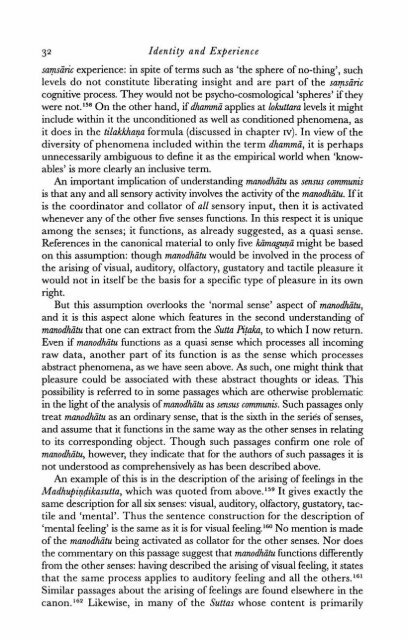Identity and Experience_Hamilton_1996
Identity and Experience_Hamilton_1996
Identity and Experience_Hamilton_1996
You also want an ePaper? Increase the reach of your titles
YUMPU automatically turns print PDFs into web optimized ePapers that Google loves.
3 * <strong>Identity</strong> <strong>and</strong> <strong>Experience</strong><br />
samsrZric experience: in spite of terms such as 'the sphere of no-thing', such<br />
levels do not constitute liberating insight <strong>and</strong> are part of the samsiin'c<br />
cognitive process. They would not be psycho-cosmological 'spheres' if they<br />
were not.15* On the other h<strong>and</strong>, if dhammii applies at lokuttara levels it might<br />
include within it the unconditioned as well as conditioned phenomena, as<br />
it does in the tilakkhana formula (discussed in chapter IV). In view of the<br />
diversity of phenomena included within the term dhammii, it is perhaps<br />
unnecessarily ambiguous to define it as the empirical world when 'knowable~'<br />
is more clearly an inclusive term.<br />
An important implication of underst<strong>and</strong>ing manodhiitu as smus communis<br />
is that any <strong>and</strong> all sensory activity involves the activity of the manodhGtu. If it<br />
is the coordinator <strong>and</strong> collator of all sensory input, then it is activated<br />
whenever any of the other five senses functions. In this respect it is unique<br />
among the senses; it functions, as already suggested, as a quasi sense.<br />
References in the canonical material to only five kiimapnii might be based<br />
on this assumption: though manodhztu would be involved in the process of<br />
the arising of visual, auditory, olfactory, gustatory <strong>and</strong> tactile pleasure it<br />
would not in itself be the basis for a specific type of pleasure in its own<br />
right.<br />
But this assumption overlooks the 'normal sense' aspect of manodhiitu,<br />
<strong>and</strong> it is this aspect alone which features in the second underst<strong>and</strong>ing of<br />
manodhiitu that one can extract from the Sutta FiFitaku, to which I now return.<br />
Even if manodhiitu functions as a quasi sense which processes all incoming<br />
raw data, another part of its function is as the sense which processes<br />
abstract phenomena, as we have seen above. As such, one might think that<br />
pleasure could be associated with these abstract thoughts or ideas. This<br />
possibility is referred to in some passages which are otherwise problematic<br />
in the light of the analysis of manodhiitu as s m communir. Such passages only<br />
treat manodhitu as an ordinary sense, that is the sixth in the series of senses,<br />
<strong>and</strong> assume that it functions in the same way as the other senses in relating<br />
to its corresponding object. Though such passages confirm one role of<br />
manodhiitu, however, they indicate that for the authors of such passages it is<br />
not understood as comprehensively as has been described above.<br />
An example of this is in the description of the arising of feelings in the<br />
Madhupindikasutta, which was quoted from above.159 It gives exactly the<br />
same description for all six senses: visual, auditory, olfactory, gustatory, tactile<br />
<strong>and</strong> 'mental'. Thus the sentence construction for the description of<br />
'mental feeling' is the same as it is for visual feeling. 160 No mention is made<br />
of the manodhiitu being activated as collator for the other senses. Nor does<br />
the commentary on this passage suggest that manodbiitu functions differently<br />
from the other senses: having described the arising of visual feeling, it states<br />
that the same process applies to auditory feeling <strong>and</strong> all the others.161<br />
Similar passages about the arising of feelings are found elsewhere in the<br />
canon.162 Likewise, in many of the Suttas whose content is primarily


